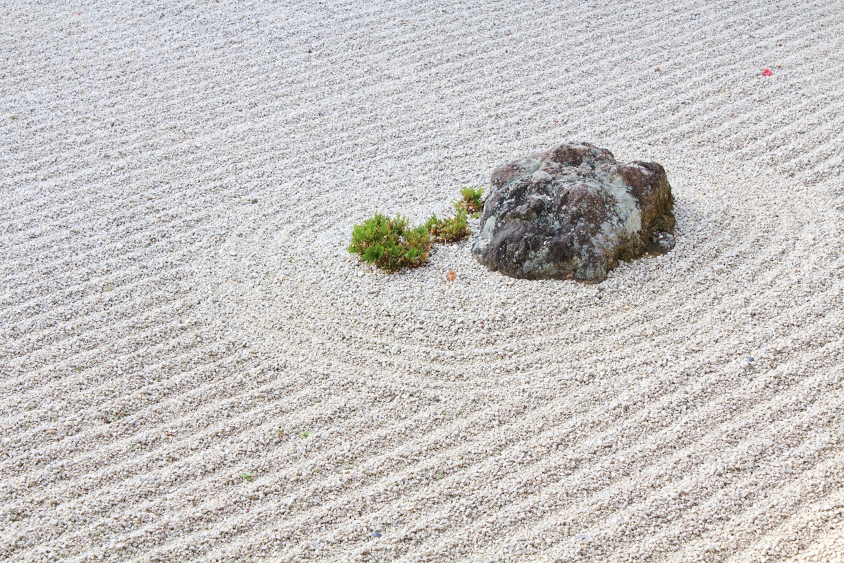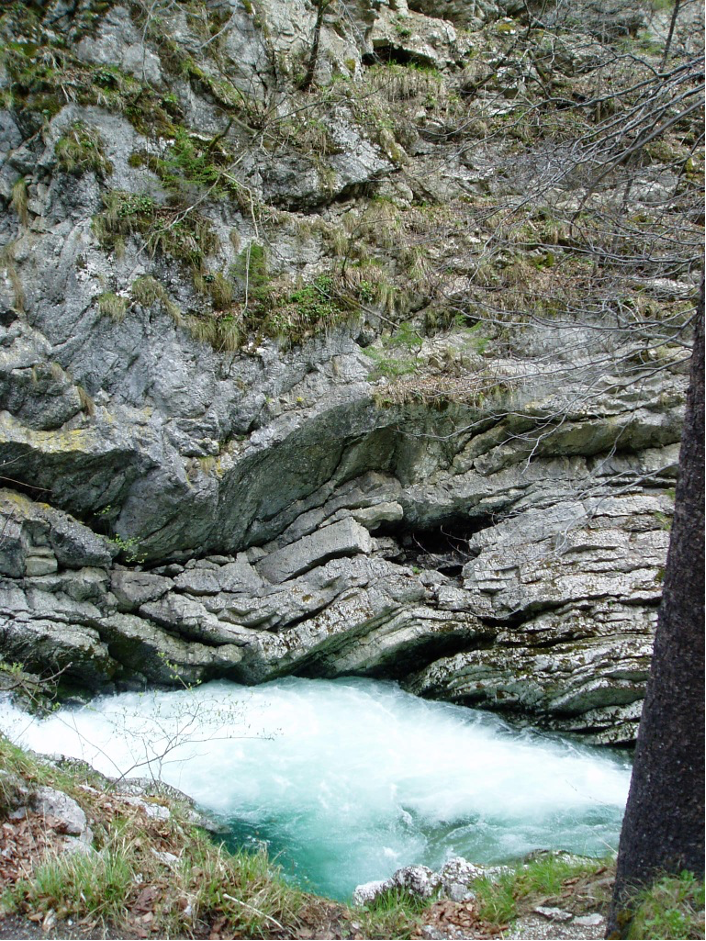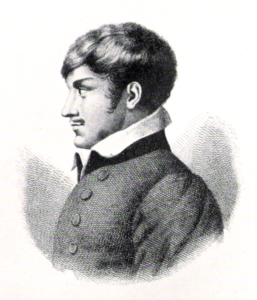Oh spring, why are you flowing so swiftly and savagely
(Poet's title: O Quell, was strömst du rasch und wild)
Set by Schubert:
D 874
incomplete[January 1826]
Die Blume.
O Quell, was strömst du rasch und wild,
Und wühlst in deinem Silbersande,
Und drängst, von weißem Schaum verhüllt,
Dich schwellend auf am grünen Rande?
O riesle, Quell,
Doch glatt und hell,
Dass ich, verklärt im zartem Taue,
Mein zitternd Bild in dir erschaue.
Der Quell.
O Blume, kann ich ruhig sein,
Wenn sich dein Bild in mir bespiegelt,
Und wunderbare Liebespein
Mich bald zurückhält, bald beflügelt?
Drum streb ich auf
Mit irrem Lauf
Und will mit schmachtendem Verlangen,
Du Zarte, deinen Kelch umfangen.
Die Blume.
O Quell, ich stehe viel zu fern,
Du kannst dich nie zu mir erheben;
Doch freundlich soll mein Blütenstern
Auf deiner heitern Fläche beben.
Drum riesle hin
Mit stillem Sinn;
Süß ist’s, im Busen ohne Klagen
Der Liebsten keusches Bild zu tragen.
Der Quell.
O Blume, Rat und Trost ist leicht,
Doch schwer ist’s, hoffnungslos zu glühen;
Wenn auch mein Kuss dich nie erreicht,
So muss ich ewig doch mich mühen.
Ein Blatt allein
Lass du hinein
In meine wilde Tiefe fallen,
Dann will ich still vorüberwallen.
The flower.
Oh spring, why are you flowing swiftly and savagely,
And why are you burrowing into your silver sand,
And, covered with white foam, why are you pressing
Yourself and swelling up against the green bank?
Oh spring, trickle
Smoothly and brightly, will you,
So that, transfigured in the delicate dew, I
Can see my trembling face in you.
The spring.
Oh flower, can I be calm
When your image is mirrored in me,
And amazing pains of love
Sometimes hold me back and sometimes give me wings?
I therefore surge upwards
With a wayward course,
And with a churning longing I want
To embrace your calyx, you tender being.
The flower.
Oh spring, I am standing much too far away,
You can never rise up to reach me;
The star of my petals will be friendly
And will tremble on your bright surface.
So trickle along,
With a quiet mind;
It is sweet not to complain and to
Carry the chaste image of the beloved in your breast.
The spring.
Oh flower, advice and solace are easy,
But it is hard to glow without hope;
If it is true that my kiss can never reach you
I shall nevertheless have to keep on striving forever.
A single petal,
Drop a single petal
And let it fall into my savage depths,
Then I will be able to flow past quietly.
All translations into English that appear on this website, unless otherwise stated, are by Malcolm Wren. You are free to use them on condition that you acknowledge Malcolm Wren as the translator and schubertsong.uk as the source. Unless otherwise stated, the comments and essays that appear after the texts and translations are by Malcolm Wren and are © Copyright.
☙
Themes and images in this text:
Dew Flowers Foam and spray Green Mirrors and reflections Sand Silver Springs, sources and fountains Surface of the water White
Ernst Schulze’s ‘Poetisches Tagebuch’ (Poetic Diary) contains about 80 poems, nearly all headed by the specific dates on which they were written, ranging from 29th June 1813 to 17th February 1817. ‘O Quell, was strömst du rasch und wild‘ has the ‘title’ ‘Am 8ten Januar 1814‘ and appears as the 11th of 16 poems in a sub-section called ‘Cäcilie, eine Geisterstimme‘ (Cäcilie, the voice of a spirit).
Cäcilie Tychsen had died on 3rd December 1812, and by the time Schulze was writing the poems that were to form his Poetic Diary he had transferred his affections (if that is not too tame a word for his manic obsession) to Cäcilie’s younger sister Adelheid. Or perhaps it is fairer to say that both sisters contributed to the passions that gave rise to the poetry whilst also admitting that the poems show little objective interest in either: the main focus of the poet’s attention is his own churning longing.
This poem is unique in the collection in that it is in the form of a dialogue. The beloved is actually given some sort of voice (in this case a flower – a feminine noun in German, eine Blume); the poet speaks with the voice of a spring (ein Quell, masculine). The flower (with its star-like pattern of petals) looks down at the swirling water and complains that there is no smooth surface in which she can see her reflection. It is as if the poet is admitting that his own turbulence is preventing him from portraying an image of the beloved. All that is apparent is the perpetual agitation within (emphasised by the strong verbs in stanza 1: strömst, wühlst, drängst, schwellend).
Such verbs would normally only apply to a raging flood or to a mighty stream rather than to the trickle or pool of a spring. The whirling waters are not buffetting rocks but burrowing into silver sand. It is as if the poet has taken a lesson from a zen garden and is able to see the mighty dimensions hidden within features presented on a smaller scale. Like a photographer using a macro lens, he is revealing an agitated world that is hidden to those without the eyes or the sensitivity to be aware of it.


Photo: Malcolm Wren
☙
Original Spelling O Quell, was strömst du rasch und wild Die Blume. O Quell, was strömst du rasch und wild, Und wühlst in deinem Silbersande, Und drängst, von weißem Schaum verhüllt, Dich schwellend auf am grünen Rande? O riesle, Quell, Doch glatt und hell, Daß ich, verklärt im zartem Thaue, Mein zitternd Bild in dir erschaue. Der Quell. O Blume, kann ich ruhig seyn, Wenn sich dein Bild in mir bespiegelt, Und wunderbare Liebespein Mich bald zurückhält, bald beflügelt? Drum streb' ich auf Mit irrem Lauf Und will mit schmachtendem Verlangen, Du Zarte, deinen Kelch umfangen. Die Blume. O Quell, ich stehe viel zu fern, Du kannst dich nie zu mir erheben; Doch freundlich soll mein Blüthenstern Auf deiner heitern Fläche beben. Drum riesle hin Mit stillem Sinn; Süß ist's, im Busen ohne Klagen Der Liebsten keusches Bild zu tragen. Der Quell. O Blume, Rath und Trost ist leicht, Doch schwer ist's, hoffnungslos zu glühen; Wenn auch mein Kuß dich nie erreicht, So muß ich ewig doch mich mühen. Ein Blatt allein Laß du hinein In meine wilde Tiefe fallen, Dann will ich still vorüberwallen.
Confirmed by Peter Rastl with Schubert’s source, Ernst Schulze’s sämmtliche poetische Schriften. Dritter Band. I. Poetisches Tagebuch. […] Leipzig: F. A. Brockhaus. 1819, pages 45-46 and with Sämmtliche poetische Werke von Ernst Schulze. Neue Ausgabe mit sechszehn Kupfern. Dritter Theil. Leipzig: F. A. Brockhaus. 1822, pages 46-47.
To see an early edition of the text, go to page 45 [61 von 336] here: http://digital.onb.ac.at/OnbViewer/viewer.faces?doc=ABO_%2BZ170542803


